calsfoundation@cals.org
John Little McClellan (1896–1977)
John Little McClellan served longer in the U.S. Senate than any other Arkansan (1942–1977) and was one of its most powerful members. Under McClellan’s leadership, the Senate conducted some of its most significant investigations, including probes into the activities of such men as Jimmy Hoffa, Dave Beck, and Billie Sol Estes. Today, the McClellan-Kerr Arkansas River Navigation System serves as a notable example of the senator’s belief that large federal projects would boost Arkansas’s prosperity.
John McClellan was born on February 25, 1896, on a farm near Sheridan (Grant County) to Isaac S. and Belle Suddeth McClellan. The McClellans were staunch Democrats and named their son for Congressman John Little.
Educated in public schools, McClellan became interested in law and studied in his father’s law office when not busy on the family’s farm. He was admitted to the Arkansas Bar Association in 1913 at the age of seventeen, becoming the youngest attorney in the United States. McClellan married Eula Hicks of Sheridan on November 2, 1913. They divorced in 1921. The couple had two children.
McClellan practiced law with his father in Grant County until August 1917, when he joined the U.S. Army as a first lieutenant in the Aviation Section of the Signal Corps during World War I. He opened a law office in Malvern (Hot Spring County) following his February 1919 honorable discharge from the military.
McClellan’s long political career began in 1920 when he was chosen city attorney of Malvern, a post he held until 1926. At age thirty, he was elected prosecuting attorney for the Seventh Judicial District of Arkansas. Elected to Congress in 1934, he served two terms (1935–1938) in the U.S. House of Representatives from the Sixth Congressional District of Arkansas.
McClellan married Lucille Smith of Malvern on November 8, 1922, and they had three children. She died in 1935. On November 10, 1937, McClellan was wed for the third time, marrying Norma Myers Cheatham.
In 1938, McClellan unsuccessfully challenged Senator Hattie Caraway for her seat, losing a close Democratic primary. He resumed the practice of law in Camden (Ouachita County), then ran for Arkansas’s other Senate seat in 1942, which he won. McClellan was reelected five times, overcoming stiff challenges by Sid McMath in 1954 and David Pryor in 1972. The senator served until his death in 1977, representing the people of Arkansas in the Senate longer than anyone in the state’s history. McClellan also earned one of the most influential Senate committee ranks ever attained by an Arkansan, that of chair of the Committee on Appropriations.
McClellan advanced to a number of prominent positions in the Senate. Contemporaries characterized him as intelligent, tireless, and a superb legislative craftsman. The McClellan-Kerr Arkansas River Navigation System of locks and dams traversing Arkansas and Oklahoma is a prime example of his leadership in cultivating opportunity and progress in Arkansas and the Southwest. Numerous dams, lakes, drainage and flood control projects, wildlife habitats, forest preserves, and recreational facilities bear his stamp. For many years, the combination of McClellan, Senator J. W. Fulbright, and Representative Wilbur D. Mills gave Arkansas one of the nation’s most powerful congressional delegations. McClellan sided with Republican leadership from time to time but consistently joined his Arkansas colleagues in opposition to civil rights legislation.
McClellan served for twenty-two years as chairman of the Committee on Government Operations and as chairman of the Senate Permanent Subcommittee on Investigations for eighteen years. As a member of the latter, the senator first emerged as a national figure during the Army-McCarthy hearings of 1954. McClellan led a Democratic walk-out of the Republican-controlled subcommittee because of objections to Senator Joseph McCarthy’s witch-hunting conduct. In 1955, McClellan assumed chairmanship and hired Robert F. Kennedy as chief counsel. As chair of that subcommittee and two other investigative committees—the Senate Committee on Improper Activities in the Labor or Management Field and the Special Committee to Investigate Political Activities, Lobbying and Campaign Contributions—he conducted more congressional investigations than any other member.
Under McClellan’s leadership, some of the most well-known and significant investigations in the nation’s history were conducted—probes into widespread corruption and criminal activities in the labor-management field, organized crime, the TFX aircraft contract, profiteering in defense contracts for missile procurement, and the riots that erupted in cities and college campuses in the late 1960s. Inquiries concerning the activities of teamsters Dave Beck and Jimmy Hoffa, the so-called “Valachi hearings,” and investigations surrounding the affairs of Texas financier Billie Sol Estes all catapulted McClellan into the public eye. As a vigorous and relentless investigator, McClellan won a reputation for judicial impartiality and fairness.
As a member of both the first and second Hoover commissions, McClellan authored many of its recommendations to reorganize the federal government, resulting in savings of millions of dollars to taxpayers. Prominent among these was his sponsorship of legislation that created the General Services Administration, the business arm of the federal government. He was also the co-author of the 1976 bill that resulted in the first complete revision of the U.S. copyright laws since 1909.
A leading advocate of law enforcement, McClellan was a key figure in winning congressional approval for many significant laws and programs. Among them were the landmark Omnibus Crime Control and Safe Streets Acts of 1968 and 1970, as well as the Organized Crime Control Act of 1970. In his thirty-five years as a senator, McClellan introduced more than 1,000 bills; 140 were signed into law.
McClellan’s family suffered several tragic losses. After losing his second wife to spinal meningitis in 1935, McClellan’s three sons died within a relatively short period of time: Max died of spinal meningitis in Africa in 1943 while serving in World War II; John L. Jr. died in 1949 from injuries caused by an automobile accident, and James H. “Jimmy” died in a plane crash in 1958.
McClellan died on November 28, 1977, in Little Rock (Pulaski County) and is buried in Roselawn Memorial Park. At the time of his death, he ranked second in seniority in the U.S. Senate and was one of its most powerful members.
For additional information:
Laymon, Sherry. Fearless: John L. McClellan, United States Senator. Mustang, OK: Tate Publishing, 2011.
———. “John McClellan and the Arkansas River Navigation Project.” Arkansas Historical Quarterly 69 (Summer 2010): 140–169.
“McClellan Dies at 81; Power in the Senate.” Arkansas Gazette. November 29, 1977, p. 1A, 8A.
McClellan, John L. Crime Without Punishment. New York: Duell, Sloan, and Pearce, 1962.
Pierce, Michael. “John McClellan, the Teamsters, and Biracial Labor Politics in Arkansas, 1947–1959.” In Life and Labor in the New South, edited by Robert H. Zeiger. Gainesville: University Press of Florida, 2012.
Senator John L. McClellan Collection. Riley-Hickingbotham Library Special Collections. Ouachita Baptist University, Arkadelphia, Arkansas.
Wendy Richter
Arkansas History Commission


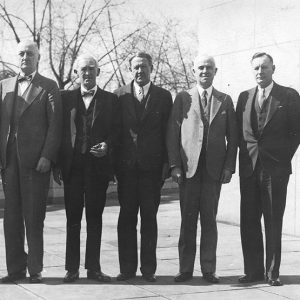

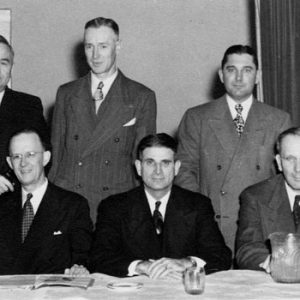
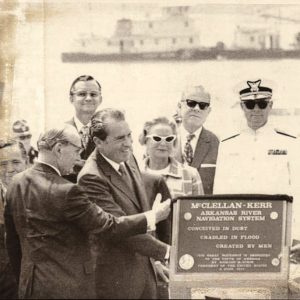
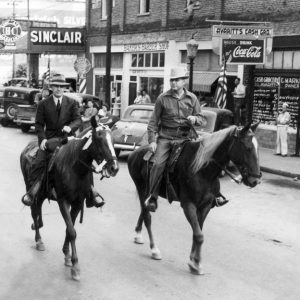
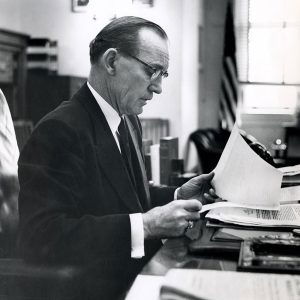
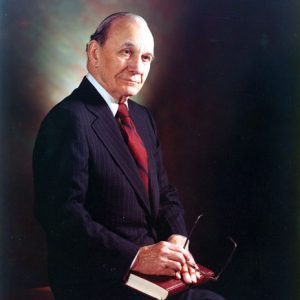
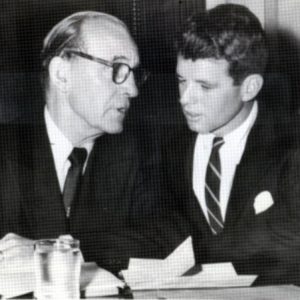
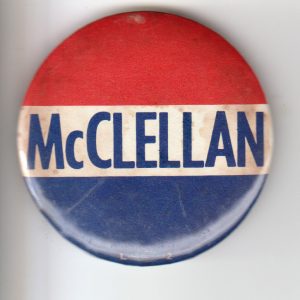





I was ten years old in the early spring of 1960 (within a year of my father’s death), and my aunt–a Van Buren, Arkansas, gal–gave me a fond memory of meeting Senator McClellan at his Capitol office in D.C. during the run up to Mr. Kennedy’s election to the presidency. I remember that he was quite proud of a collection of gavels that he had either used or were presented to him as gifts (mementos/awards). Further, he had us seated in the gallery by one of his staffers, and it was there that I waved to Mr. Kennedy (quickly pointed out by my aunt as not allowed). I was and still am awed by all that takes place on the floor of the United States Senate.
This was my great-uncle, a man that I truly admire in so many ways. I was eight months old when he passed away. I would love to meet and speak with anyone who had the pleasure of knowing him.